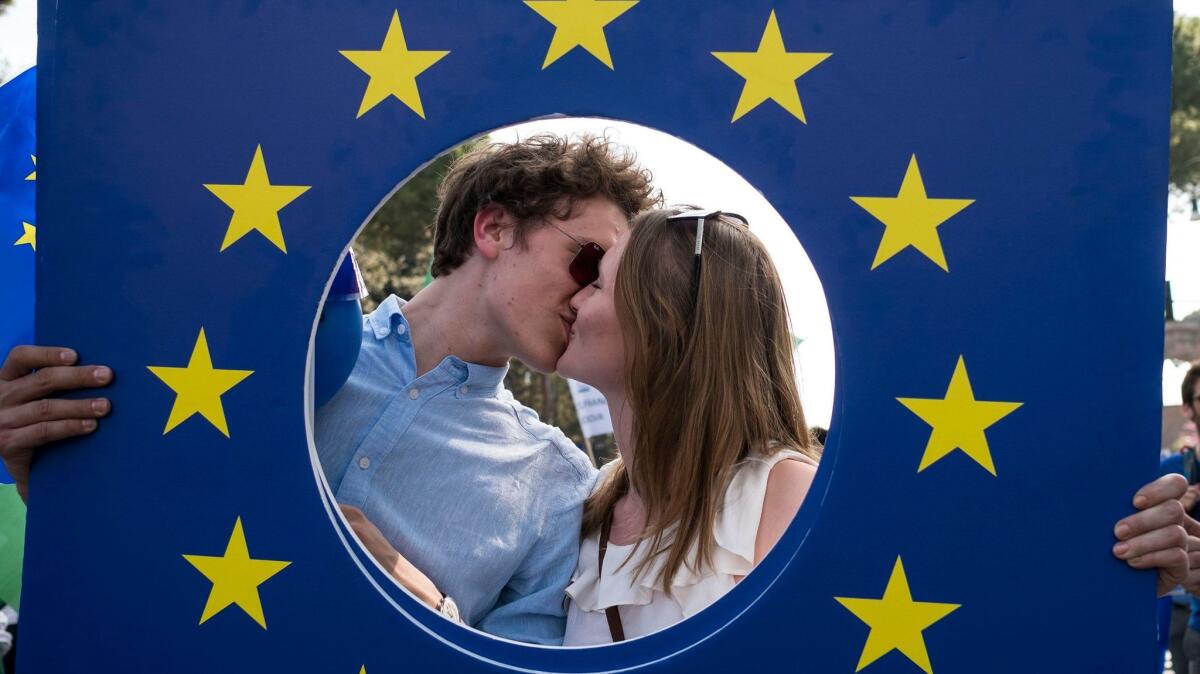As EU celebrates 60th anniversary, Turkey considers a vote on joining

- Share via
Reporting from ROME — With Britain poised to start divorce proceedings, the 27 remaining European Union nations put pen to paper Saturday in Rome to renew their vows for continued unity in the face of crises that are increasingly testing the bonds between members.
Meanwhile, Turkey’s president said Saturday that the country might pursue a “Brexit”-like referendum on whether to seek European Union membership.
President Recep Tayyip Erdogan brought up the proposal at a Turkish-U.K. forum in the southern city of Antalya, referring to the British departure from the EU and saying Turkey “might” hold a similar referendum after the April 16 vote to expand the powers of the Turkish presidency.
The negotiation process for Turkey’s EU membership began in 2005, but has been at a standstill for years.
The EU nations marked the 60th anniversary of their founding treaty as a turning point in their history. British Prime Minister Theresa May is set to officially trigger divorce proceedings from the bloc next week — a fact that European Commission President Jean-Claude Juncker called “a tragedy.”
Determined to show that unity is the only way ahead in a globalized world, the EU leaders were able to walk away from a summit without acrimony, which was already sort of a victory.
“We didn’t have a major clash or conflict, contrary to what many thought,” Juncker said.
European Council President Donald Tusk said that sustained unity was the only way for the EU to survive.
“Europe as a political entity will either be united, or will not be at all,” he told EU leaders at a solemn session in the same ornate hall on the ancient Capitoline Hill where the Treaty of Rome, which helped found the EU, was signed on March 25, 1957.
To move ahead though, the EU leaders recognized that full unity on all things will be unworkable. Pushed by several Western European nations, they enshrined a pledge to give member nations more freedom to form partial alliances and set policy when unanimity is out of reach.
“We will act together, at different paces and intensity where necessary, while moving in the same direction,” said the Rome Declaration signed by the 27 nations.
The EU has often used a multi-speed approach in the past, with only 19 nations using the shared euro currency and not all members participating in the Schengen borderless travel zone. The approach has already been extended to social legislation among EU nationals.
German Chancellor Angela Merkel sought to assuage fears that it would lead to a further unraveling of unity.
“The Europe of different speeds does not in any way mean that it is not a common Europe,” Merkel said after the ceremony. “We are saying here very clearly that we want to go in a common direction. And there are things that are not negotiable” — the EU freedom of movement, goods, people and services.
With Britain leaving, the mantle of recalcitrant member seems to have been taken over by Poland. Still, Polish Prime Minister Beata Szydlo was more subdued than at the last EU summit two weeks ago, when she refused to adopt conclusions that need unanimity. Poland also balked at signing the new treaty until the eve of the ceremony.
The Rome declaration is the first step toward renewing the unity of the EU, Szydlo told reporters.
More to Read
Sign up for Essential California
The most important California stories and recommendations in your inbox every morning.
You may occasionally receive promotional content from the Los Angeles Times.










